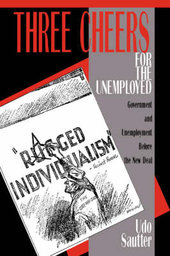
|
Three Cheers for the Unemployed: Government and Unemployment before the New Deal
Paperback / softback
Main Details
| Title |
Three Cheers for the Unemployed: Government and Unemployment before the New Deal
|
| Authors and Contributors |
By (author) Udo Sautter
|
| Physical Properties |
| Format:Paperback / softback | | Pages:420 | | Dimensions(mm): Height 235,Width 158 |
|
| ISBN/Barcode |
9780521533270
|
| Classifications | Dewey:331.137973 |
|---|
| Audience | | Professional & Vocational | |
|---|
| Illustrations |
Worked examples or Exercises
|
|
Publishing Details |
| Publisher |
Cambridge University Press
|
| Imprint |
Cambridge University Press
|
| Publication Date |
13 February 2003 |
| Publication Country |
United Kingdom
|
Description
Three Cheers for the Unemployed describes the beginnings and development of unemployment reform up to the New Deal. As a consequence of the large-scale industrialization after the Civil War, joblessness could no longer be considered to be caused by character defects, but had to be ascribed to societal forces. It became clear that traditional remedial measures could not cope with the problem adequately. In times of depression, the large number of unemployed far exceeded the aid capacity of private philanthropies and civic authorities. And the continuous expansion of the labor market made it obvious that local action would remain insufficient, especially if prevention could take the place of the less-desirable solution. By the time the United States entered World War I, reformist thinkers had devised the major tools that were later used to deal with unemployment. After the war and during most of the 1920s, these tools underwent thorough examination and refinement. The early years of the Great Depression saw them used tentatively. On the eve of the New Deal, a well-reasoned and successfully tested group of social programs was available. This book essentially refutes a social-control explanation for this process. It demonstrates that the unemployment measures of the New Deal emanated from the reformist endeavors of the Progressive Age.
Reviews"Sautter's book is extremely sensitive to developing labor and business ideologies, uncovering Hoover's reaction to the demands of relief, detecting the effects of business cycles, and showing the infuence of scientific management. In the end, it covers most of the period in considerable depth, and the thesis that most New Deal labor-market policy was developed in this era is clearly proven." Symposium "This study contains an impressively detailed account of the history of the United States Employment Service. It also succeeds in locating and spelling out the links between the efforts of the Hoover administration and the ideas of well-known Progressive Era reformers; in so doing, it contributes to our understanding of the trajectory of unemployment reform from the early twentieth century to the New Deal." The Journal of American History "Captive to the concerns and perspectives of the early twentieth century, reformers provided at best partial answers to the problem of unemployment. Sautter has written a comprehensive guide to their limited agenda. His work is essential to anyone who hopes to understand the intriguing relationship between unemployment and government in the twentieth century." American Historical Review "Sautter's main goal is to trace reformers' attempts to get legislation enacted that would either lessen the likelihood of unemployment occurring or alleviate its impact...The book's contribution lies in the thoroughness of its research...The book represents the culmination of years of massive research...anyone desiring to research material on unemployment reform will need to consult this book." Reviews in American History "Udo Sautter's new study therefore comes as a timely and welcome addition to an otherwise sparse literature." Times Higher Education Supplement Sautter's book is extremely sensitive to developing labor and business ideologies, uncovering Hoover's reactions to the demands of relief, detecting the effects of business cycles, and showing the influence of scientific management. In the end, it covers most of the period in considerable depth, and the thesis that most New Deal labor-market policy was developed in this era is clearly proven." Thomas Janoski, Contemporary Sociology "Udo Sautter's Three Cheers for the Unemployed, then, an impressively researched and very well written analysis fills an important gap in American History--and fills it very well indeed." American Journal of Sociology "The historical research is impeccable and Three Cheers for the Unemployed is a distinguished study." Desmond King, Journal of Policy History
|